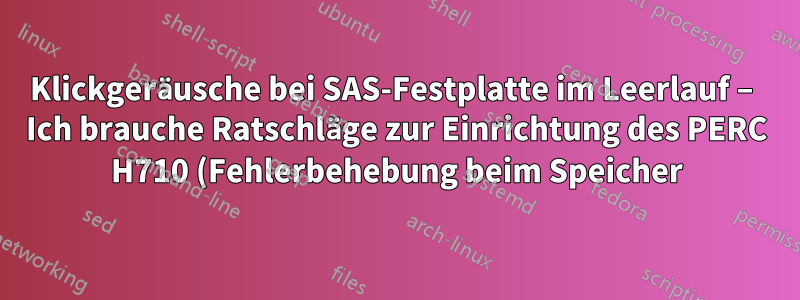.png)
Ich habe vor Kurzem 5 gebrauchte SAS-Festplatten mit einer Lebensdauer von jeweils ca. 35 Tagen erworben. Im Vergleich zum Kauf neuer Festplatten war das ein tolles Angebot, aber es gab eine kleine Verwechslung, da ich zunächst dachte, es handele sich um SATA-Festplatten. Nach einigen Nachforschungen kaufte ich einen RAID-Controller (und verwendete ihn als HBA), den PERC H710. Nachdem ich jedoch alles installiert hatte, bemerkte ich, dass diese SAS-Festplatten im Leerlauf ein seltsames Klickgeräusch erzeugen. Ich halte es für unwahrscheinlich, dass alle fünf Festplatten, die gut verpackt waren, dasselbe Problem haben, insbesondere angesichts des guten Rufs des Verkäufers. Ich habe das Geräusch als Referenz aufgezeichnet:
Näher am Server: https://www.youtube.com/shorts/DFqMGDFCObU
Im anderen Raum (andere Seite der Wand): https://www.youtube.com/shorts/4jHKJnIhp2Q PS: Es kann schwierig sein, im Video etwas zu hören, insbesondere wenn einige SATA-Festplatten laufen. Der Server ist in Produktion, daher wird auf diesen anderen SATA-Festplatten laufend gelesen/geschrieben.
Hier sind einige Informationen zu einem von ihnen:
=== START OF INFORMATION SECTION ===
Vendor: SEAGATE
Product: ST33000650SS
Revision: RS16
Compliance: SPC-4
User Capacity: 3,000,592,982,016 bytes [3.00 TB]
Logical block size: 512 bytes
Rotation Rate: 7200 rpm
Form Factor: 3.5 inches
Logical Unit id: 0x5000c50055ad05e3
Serial number: Z295A8NC
Device type: disk
Transport protocol: SAS (SPL-3)
Local Time is: Wed Feb 21 17:40:10 2024 EST
SMART support is: Available - device has SMART capability.
SMART support is: Enabled
Temperature Warning: Disabled or Not Supported
=== START OF READ SMART DATA SECTION ===
SMART Health Status: OK
Current Drive Temperature: 48 C
Drive Trip Temperature: 68 C
Accumulated power on time, hours:minutes 63899:38
Manufactured in week 43 of year 2012
Specified cycle count over device lifetime: 10000
Accumulated start-stop cycles: 70
Specified load-unload count over device lifetime: 300000
Accumulated load-unload cycles: 12281
Elements in grown defect list: 0
Hat jemand schon einmal ein ähnliches Problem mit SAS-Festplatten festgestellt? Ist das normales Verhalten für SAS oder sollte ich einige Tests durchführen? Jeder Rat wäre sehr willkommen!
Antwort1
nachdem wir den folgenden Befehl ausgeführt und auf dessen Abschluss gewartet haben, wird uns die Meldung „insgesamt korrigierte Lesefehler = 1809673244“ angezeigt und der Treiber hat aufgehört, diese Geräusche zu machen.
smartctl -tlong /dev/sdX
Hier ist die Ausgabe nach Abschluss:
root@abc:~# smartctl -a /dev/sda
smartctl 7.2 2020-12-30 r5155 [x86_64-linux-5.10.0-27-amd64] (local build)
Copyright (C) 2002-20, Bruce Allen, Christian Franke, www.smartmontools.org
=== START OF INFORMATION SECTION ===
Vendor: SEAGATE
Product: ST33000650SS
Revision: RS16
Compliance: SPC-4
User Capacity: 3,000,592,982,016 bytes [3.00 TB]
Logical block size: 512 bytes
Rotation Rate: 7200 rpm
Form Factor: 3.5 inches
Logical Unit id: 0x5000c50055ad05e3
Serial number: Z295A8NC
Device type: disk
Transport protocol: SAS (SPL-3)
Local Time is: Thu Feb 22 09:40:48 2024 EST
SMART support is: Available - device has SMART capability.
SMART support is: Enabled
Temperature Warning: Disabled or Not Supported
=== START OF READ SMART DATA SECTION ===
SMART Health Status: OK
Current Drive Temperature: 43 C
Drive Trip Temperature: 68 C
Accumulated power on time, hours:minutes 63915:46
Manufactured in week 43 of year 2012
Specified cycle count over device lifetime: 10000
Accumulated start-stop cycles: 70
Specified load-unload count over device lifetime: 300000
Accumulated load-unload cycles: 12283
Elements in grown defect list: 0
Vendor (Seagate Cache) information
Blocks sent to initiator = 3623441469
Blocks received from initiator = 3686219937
Blocks read from cache and sent to initiator = 272821687
Number of read and write commands whose size <= segment size = 36308955
Number of read and write commands whose size > segment size = 15
Vendor (Seagate/Hitachi) factory information
number of hours powered up = 63915.77
number of minutes until next internal SMART test = 55
Error counter log:
Errors Corrected by Total Correction Gigabytes Total
ECC rereads/ errors algorithm processed uncorrected
fast | delayed rewrites corrected invocations [10^9 bytes] errors
read: 1809673244 0 0 1809673244 0 30248.740 0
write: 0 0 0 0 0 8554.361 0
verify: 2794696942 0 0 2794696942 0 1042801.370 0
Non-medium error count: 59813
SMART Self-test log
Num Test Status segment LifeTime LBA_first_err [SK ASC ASQ]
Description number (hours)
# 1 Background long Completed 32 63907 - [- - -]
# 2 Background short Completed 32 63890 - [- - -]
# 3 Background short Completed 32 23 - [- - -]
# 4 Background long Completed 32 22 - [- - -]
Long (extended) Self-test duration: 27600 seconds [460.0 minutes]
root@abc:~#
Ich hoffe, das hilft jemandem mit dem gleichen Problem!


